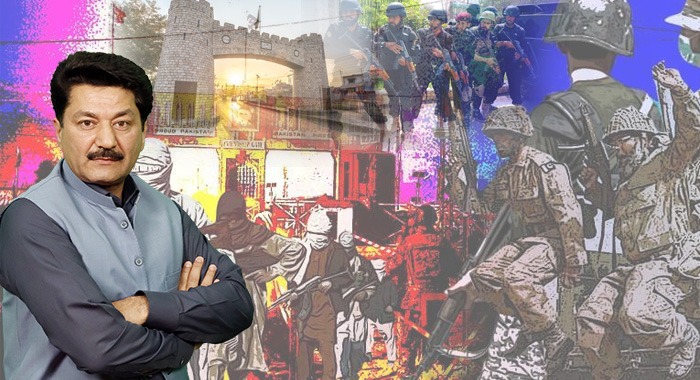Fida Adeel
The deteriorating security situation in Khyber Pakhtunkhwa (KP) has once again come under the spotlight as a convergence of militant resurgence, inadequate counterterrorism preparedness, and complex cross-border dynamics threatens to destabilize the region. While recent attacks in Dera Ismail Khan and Bannu have triggered alarm bells, what’s more troubling is the apparent disarray among provincial and federal authorities on how to stem the tide of violence.
Had militant groups succeeded in targeting key political leaders like Maulana Mahmood or drawing them into their narrative, the KP government would have been left without justification or coherent response. Even Governor Faisal Karim Kundi, who represents D.I. Khan also the constituency of both Maulana Fazlur Rehman and Chief Minister Ali Amin Gandapur publicly acknowledged that the area is no longer safe after dark.
On the same day media reported a fresh wave of violence, Aghaz Gandapur, a former MPA whose father and uncle were both martyred in suicide attacks, narrowly escaped a targeted shooting. These are not isolated incidents. Areas like D.I. Khan, Tank, South Waziristan, North Waziristan, and Lakki Marwat have descended into a cycle of violence and fear, especially for government employees. Weekly reports of militants setting up illegal checkpoints and harassing civil servants have become routine.
The situation is aggravated by the sophisticated weaponry now in militant hands night vision goggles, advanced firearms, and even drones—most of which were left behind by NATO forces or seized from the collapsed Afghan National Army. In contrast, KP police remain under-equipped, under-funded, and dangerously exposed. They lack basic protective gear, armored vehicles, and technological tools to counter these modern threats.
Despite the KP government allocating Rs 13 billion for security, experts argue it is far from sufficient. A hike in the “Shuhada package” (compensation for martyred personnel) is not a substitute for institutional preparedness. “You can give Rs 10 crore instead of Rs 1 crore to the family of a martyred officer, but that will not bring the person back,” one commentator observed.
There have been small steps forward. In a recent joint operation in Bannu, police and CTD used drones and armored vehicles, arresting around 40 suspects. Yet such operations remain exceptions rather than the rule. Unless this approach becomes the standard, and unless the frontline forces are truly empowered, the ground reality will not change.
Responsibility cannot rest solely with the provincial government. The tribal belt’s proximity to Afghanistan, the porous border, and recurring cross-border incursions necessitate strong federal involvement. Security in districts like North and South Waziristan, Bajaur, and Mohmand is not a provincial issue alone—it is a national one.
The question of Afghanistan’s role is equally complex. Initially, Pakistan accused the Afghan government of harboring Tehreek-e-Taliban Pakistan (TTP) leadership. Over time, when Islamabad presented hard evidence of Afghan nationals’ involvement in attacks on Pakistani soil, Kabul began to respond. Taliban supreme leader Hibatullah Akhundzada reportedly issued a decree forbidding fighters from engaging in cross-border activities. Kabul Police Academy head Syedullah Saeed also made public statements underscoring that such operations would not be considered jihad.
This change in tone came amid attempts by India to exploit regional instability. New Delhi’s efforts to enlist Afghan cooperation against Pakistan have largely failed, and Islamabad’s diplomatic engagement with Kabul—and even Tehran—appears to be yielding dividends. As Iran battles Israeli aggression, its leadership now views India’s silence and collusion with suspicion, bringing Pakistan, Iran, China, and Afghanistan into an emerging diplomatic alignment.
Back in KP, the federal and provincial governments must put politics aside and unite on security matters. During his recent visit, Prime Minister Shehbaz Sharif, accompanied by Army Chief General Syed Asim Munir, expressed strong support for tribal regions. These commitments must now translate into action.
The people of KP, especially in the tribal districts, have shown they are not passive. They march for peace, raise white flags, and reject militancy. But their resilience should not be mistaken for infinite patience. Any counterterrorism operation must be intelligence-driven and locally informed. Civilian displacement and lack of communication only breed distrust.
The stakes are too high for blame games and bureaucratic inertia. Pakistan must recognize that the fight against militancy especially in KP is not just a provincial burden. It is a test of national resolve. Only through joint action, strategic investment, and meaningful engagement with local communities can the tide be turned.





